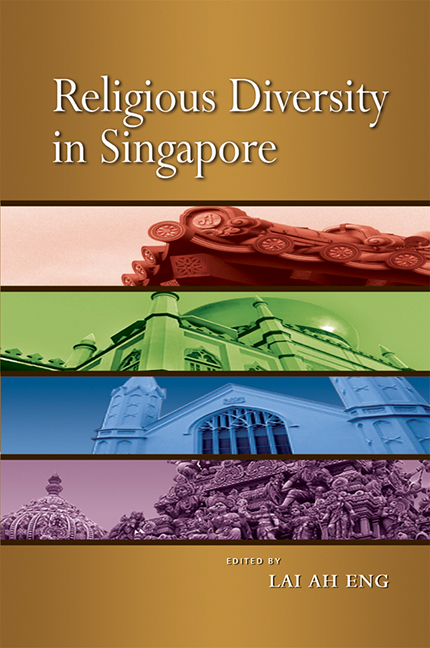Book contents
- Frontmatter
- Contents
- List of Figures and Tables
- List of Appendices
- FOREWORD
- PREFACE
- Acknowledgements
- The Contributors
- Abbreviations
- Glossary
- INTRODUCTION
- PART I The Landscape of Religious Diversity
- PART II Religion in Schools and Among the Young
- PART III Religion in the Media
- PART IV Religious Organizations in Social Services
- 19 Muslim Organizations and Mosques as Social Service Providers
- 20 Hindu Temples in Charities and Social Services
- 21 Delivering Welfare Services in Singapore: A Strategic Partnership between Buddhism and the State
- 22 Saving the City through Good Works: Christian Involvement in Social Services
- PART V Interfaith Issues and Interaction
- Index
20 - Hindu Temples in Charities and Social Services
from PART IV - Religious Organizations in Social Services
Published online by Cambridge University Press: 21 October 2015
- Frontmatter
- Contents
- List of Figures and Tables
- List of Appendices
- FOREWORD
- PREFACE
- Acknowledgements
- The Contributors
- Abbreviations
- Glossary
- INTRODUCTION
- PART I The Landscape of Religious Diversity
- PART II Religion in Schools and Among the Young
- PART III Religion in the Media
- PART IV Religious Organizations in Social Services
- 19 Muslim Organizations and Mosques as Social Service Providers
- 20 Hindu Temples in Charities and Social Services
- 21 Delivering Welfare Services in Singapore: A Strategic Partnership between Buddhism and the State
- 22 Saving the City through Good Works: Christian Involvement in Social Services
- PART V Interfaith Issues and Interaction
- Index
Summary
INTRODUCTION
Only in times of crisis does the world tend to build visions of advancement and cry out for agencies of change to negotiate the imbalances seeping through the environment. The eulogizing of religious institutions as apt agents of potential change in this new millennium is not novel. Religion has since bygone days spread its influential tentacles across the many spheres of the mundane human life. This includes the provision of services to the poor and the needy. For centuries, faith institutions have played a pivotal role in providing services to the poor, and in working to overcome the underlying roots of poverty (Marshall 2003, p. vi).
In Hinduism, the code of conduct or the Hindu Dharma is noted as a set of regulations for orienting proper conduct of life on earth. Dharma is considered the pivotal foundation for the welfare of humanity (Singapore Hindus Religious and Cultural Seminar 1971, p. 102). As charity and compassion are two of the prime virtues laid down by Dharma, temples as the abodes of the higher beings have been considered to fulfil practical social and charitable functions, apart from ritualistic and spiritual duties. However, in the fast-paced modern condition of today, there is a need to examine if temples have been able to handle successfully both social and religious duties.
Background
There are about 100,000 Hindus in Singapore. There is no available data on the number of practising Hindus and little has been researched and written about Hindus and their organizations. This small study looks at the role of Hindu temples and Hindu-related organizations in social services in Singapore. Based on primary research, it hopes to help fill this gap in knowledge and understanding, as well as to spark the interest of new and existing Hindu organizations to do more in the area of social services.
Methodology
Methodologically, data was mainly gathered through fieldwork interviews and a small case study of the Sri Mariamman Temple during 2005. Both qualitative in-depth interviews and a quantitative survey were undertaken so as to provide a balanced insight. Semi-structured Interviews with a basic probe guide were conducted with selected current and former executive committee members of Sri Mariamman Temple.
- Type
- Chapter
- Information
- Religious Diversity in Singapore , pp. 489 - 504Publisher: ISEAS–Yusof Ishak InstitutePrint publication year: 2008



